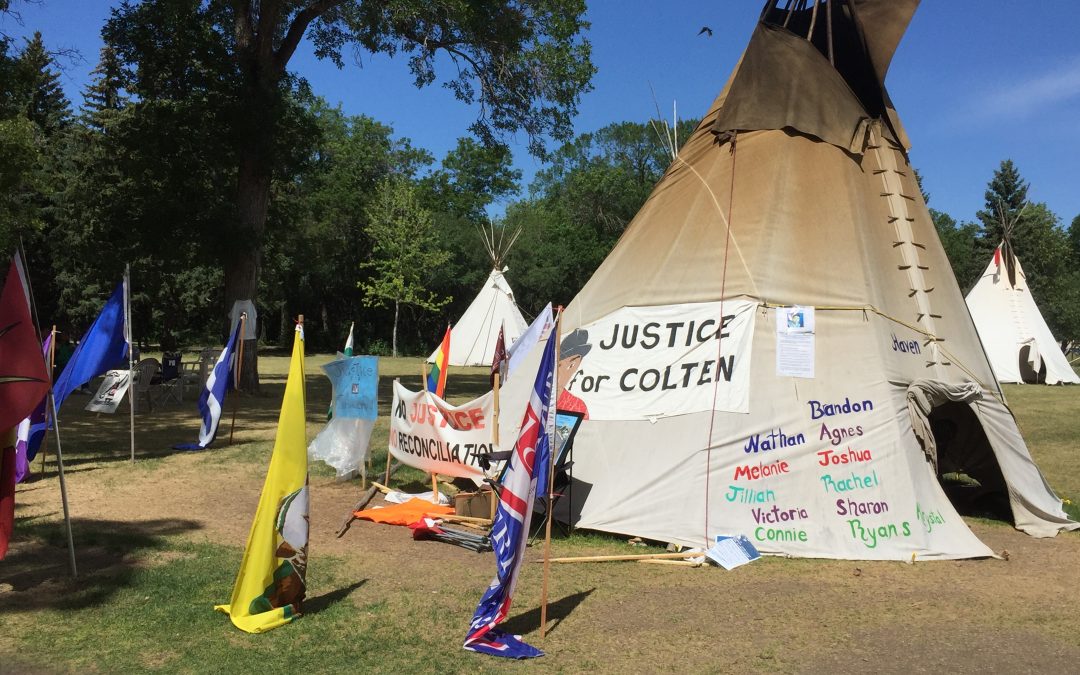The judge has reserved her decision in whether the protesters Charter Rights were violated on freedom of expression and lawful arrest and detention of six protesters June 18.
The judge also did not rule on if the camp will be removed from Wascana Park.
—————————————-
A packed courthouse in Regina today saw the protesters with the Justice for Our Stolen Children Camp and the Saskatchewan government argue over the future of the camp.
Government lawyer Michael Morris started the hearing and said this matter is not about the protesters’ rights to advocate on public land — but not allowing the government to regulate, administer and maintain public land.
Morris said the camp is flouting the bylaws and questioned that if the court allows this activity to continue, what stops other protester groups from occupying Wascana Park.
He claimed that the protesters are now deciding which members of the public are allowed to enter the west lawn, despite not owning the land.
Morris said the protesters can still protest but must apply to the Provincial Capital Commission for an exemption to allow for structures and a fire.
Government lawyer Jared Biden says the government is looking for the court to issue an order for the camp to cease occupying the west lawn of Wascana Park. Biden said the camp should be dismantled in a reasonable amount of time — and if the protesters refuse, the Provincial Capital Commission will do so and store the remaining property until it is claimed.
He noted the government is not seeking damages from the protesters.
The lawyer for the protesters, Dan LeBlanc, began outlining the camp’s case this morning, framing the argument as a freedom of expression case and that the teepee and sacred fire are culturally important to that freedom.
But the judge interjected, asking LeBlanc how the freedom of expression was violated between the hours of 11 p.m. and 5 a.m. The judge noted that freedom of expression implies an audience and dialogue, questioning the severity of the breach of rights as who is in the park overnight to participate in the protest.
The judge said freedom of expression is not absolute. Leblanc argued the sacred fire would go out if not maintained overnight and that the teepees could also be vandalized.
LeBlanc also told judge that the government is seeking to outright ban overnight camping, fires and the erection of structures.
LeBlanc argued that the government changed its bylaws on June 21 to outright ban the campers’ activity on the west lawn.
The government argued that nine previously scheduled events had to be moved due to the protesters occupying the west lawn.
LeBlanc countered by saying that the west lawn is a small plot of the entire Wascana Park and that there are other beautiful parcels of land to hold events.
LeBlanc urged the judge to consider reconciliation in her final decision and that an eviction may impede these efforts.
Another lawyer for the protesters, Meara Conway, said the Regina Police Service unlawfully arrested and detained six protesters during a forced eviction in June.
Conway argued that the officers had no right to arrest.
She said the RPS did the government’s dirty work by arresting people, which allowed Provincial Capital Commission workers to dismantle the lone teepee at Wascana Park on June 18.
The judge questioned Conway saying that there was a no trespassing order and eviction notice given to the camp prior to the police action and an agreement from the protesters to remove their teepee and sacred fire.
Police Chief Evan Bray in his affidavit states the camp was not a public threat, which was a mitigating factor in the police’s reluctance to take further action against the camp.
Regina Police lawyer Katrina Swan said today the arrests of six protesters at Wascana Park on June 18 was lawful.
She told that court that the police were there to enforce an eviction order under the Trespass to Property Act.
Swan said the six arrested actively engaged in obstruction activities like adding wood to the sacred fire and three people tied themselves to teepee poles.
She said these actions prevented the Provincial Capital Commission from dismantling the lone teepee.
Swan contended that the detention of the six arrested until after the fire was extinguished and the teepee dismantled was needed and lawful as the arrested individuals stated they would return to Wascana Park to continue obstruction activities.
Swan said while the protest is peaceful, it is unlawful — and despite numerous attempts by police to negotiate, the protesters want it all their way and on their terms.
A Court of Queen’s Bench judge must decide if the protesters’ rights were violated and if the camp should be removed.
(PHOTO: Justice for Our Stolen Children Camp at Wascana Park. File photo.)
